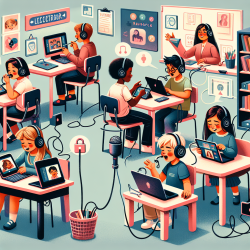The Impact of Screen Time on Children's Behavior During and After Lockdowns
The COVID-19 pandemic brought unprecedented changes to our daily lives, especially for young children whose routines were drastically altered. A recent study titled Screen media exposure and behavioral adjustment in early childhood during and after COVID-19 home lockdown periods sheds light on how these changes in screen media exposure have affected children's behavioral adjustment. This blog explores the study's findings and offers insights for practitioners working with young children.
Understanding the Study
The study conducted by Gueron-Sela et al. (2022) focused on the screen media exposure of 313 Israeli children aged 2 to 5 years during and after national COVID-19 lockdowns. Data were collected at four time points, examining various aspects of media use and its association with behavioral conduct and emotional problems.
Key Findings
- Screen time increased significantly during lockdowns and continued to rise even post-lockdown.
- Exposure to background television and the use of media to regulate child distress were associated with behavior problems during lockdowns but not post-lockdown.
- Maternal use of mobile devices while parenting increased during lockdowns, potentially impacting parent-child interactions.
Implications for Practitioners
For practitioners working with young children, understanding the nuanced effects of screen media exposure is crucial. Here are some strategies to consider:
- Encourage Balanced Media Use: Guide parents to balance screen time with other activities that promote social and emotional development.
- Promote Active Engagement: Suggest interactive and educational media content that can engage children actively rather than passively.
- Support Parental Involvement: Encourage parents to co-view media with their children to enhance learning and interaction.
- Monitor Background Media: Advise parents to be mindful of background television exposure, which can distract children from developmental activities.
Encouraging Further Research
While the study provides valuable insights, it also highlights the need for further research. Practitioners are encouraged to explore longitudinal studies that examine the long-term effects of screen media exposure on various aspects of child development, including language skills and executive function.
Conclusion
The COVID-19 pandemic has reshaped media consumption patterns for young children, with potential implications for their behavioral adjustment. By understanding these changes and their effects, practitioners can better support families in fostering healthy media habits.
To read the original research paper, please follow this link: Screen media exposure and behavioral adjustment in early childhood during and after COVID-19 home lockdown periods.










